The bus conductor collecting ticket money cuts my thoughts on Kosovo’s recent elections in half and informs us we’re not far from our destination. A couple of kilometers later and the bus stops in the middle of the route between Gjilan and Kamenica, near a bridge painted with the three colors of the Serbian flag — red, blue and white.
A nearby sign announces that we have arrived at Ranilug/Ranillug.
Almost all of the passengers turn their heads and stare at us as K2.0 photographer Atdhe and I hustle with our bags toward the exit door.
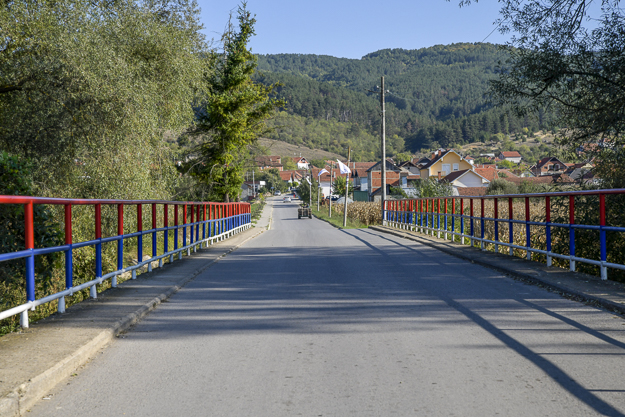
Photo: Atdhe Mulla / K2.0
For those who may have never heard of Ranilug before, some facts about the place could sound unusual. Like the one that despite having just 3,866 residents — according to the 2011 census — Ranilug is officially a municipality with its own mayor and administration, a product of the decentralization process that saw five new Serb-majority municipalities created in 2010 as part of the Ahtisaari Plan that underpinned Kosovo’s independence.
It’s also a place with more registered voters than official inhabitants, due to a combination of the civil registry not having been updated and migration, both in the immediate aftermath of the war and subsequently.
On this sunny day, the occasional car with Serbian or old KS registration plates passes us on the short walk between the flag-colored bridge and the center of the village, where the main event of the day is the repair work being carried out on the main road. A team of workers from Kamenica are getting it ready, meter by meter, for a layer of asphalt paving.
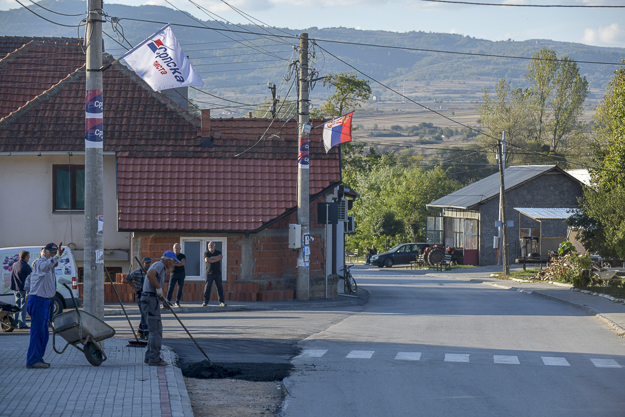
Photo: Atdhe Mulla / K2.0.
We watch from the Galerija bar on the other side of the road, sipping our strong Zaječarsko beers, a Serbian product that was very hard to find in other places in Kosovo, even before the 100 percent tax that was imposed on all products coming from Serbia by the outgoing government led by Ramush Haradinaj.
Serbian music from our bar blasts out loudly, but the tables seem to remain empty most of the time. The atmosphere from the elections is still alive.
As expected, people are generally reluctant to talk about politics, especially to journalists from Prishtina. As soon as we tell them who we are and what we’re interested in talking about, we get a standard “no politics” answer from random residents. While everyone claims that they don’t know or care about politics, the brush offs are underlied by a tension that feels as though it could be cut with a knife.
A few meters up the road, some business premises are completely covered in the electoral posters of Lista Srpska (Serb List), a party that serves as an extended arm of the government of Serbia. Their office is right in the village center, closed but for a couple of guys frequently going in and out.
Atop every utility pole in the village there are two flags — the Serbian national flag and the white flag of Lista Srpska.
Looking around at the party’s omnipresence here, it is little surprise that Lista Srpska effectively cleaned up the Serb vote; of the 2,749 valid ballots cast in Ranilug, it secured 2,536 — that equates to 92% of all voters, up from 79% in local elections two years ago.
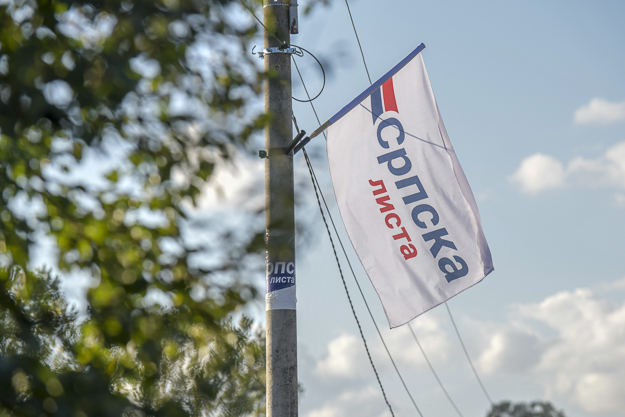
Photo: Atdhe Mulla / K2.0.
It’s a far cry from the media headlines in Prishtina and beyond that have been dominated by the meteoric rise of left-wing Albanian nationalist party Vetëvendosje, its journey to the top of the polls having only entered the political race nine years earlier, and how far it has come as a movement since its activists first graffitied “No Negotiations — Self-Determination” throughout cities, towns and villages back in 2005.
Such stories have tended to raise the question about the future of the dialogue with Serbia — a process aimed at “normalizing relations” between Prishtina and Belgrade that has been ongoing since 2011. With Vetëvendosje having consistently raised its voice against the nature of the dialogue — often in the form of mass street protests dominated by red and black Albanian flags — what next now that they’re on the cusp of power?
With pressure from the international community for a quick deal looming, and the need to overcome the paralysed status quo, party leader Albin Kurti has said that he’s open to talk to Serbia, but he has also reiterated the party’s long-held position that its priority would be to hear what Serbs in Kosovo have to say.
Fulfilling such promises would mean visiting places such as Ranilug.
All of them agree that someone from Prishtina should come to talk to them and to see each other’s needs.
A short walk from the center finds us exchanging greetings with four men working to fix the right back wheel of a bus. They initially give us the usual dismissive response when asked about the elections, but after a bit of insisting they open up a little.
“We want to live in peace with our neighbors — we want to be able to go freely to Pec [Peja] and Prizren,” says one of the men who seems the most talkative, casually smiling and gesticulating with his hands that are stained black from the metal fluids. The others murmur words of agreement.
“Before the war I used to go to Pec constantly,” he continues. “I haven’t even been there once since the war; you don’t know what’s going to happen.”
When we mention that Albin Kurti has expressed his intention to talk to Serbs living in Kosovo, he promptly replies: “He’s always changing his words. From what he says, our only option would be to go to live in Canada all together.”
Nevertheless, all of them agree that someone from Prishtina should come to talk to them and to see each other’s needs, but not one of them has anything good to say about the Prishtina-Belgrade dialogue, and they say they don’t know what to expect from it.
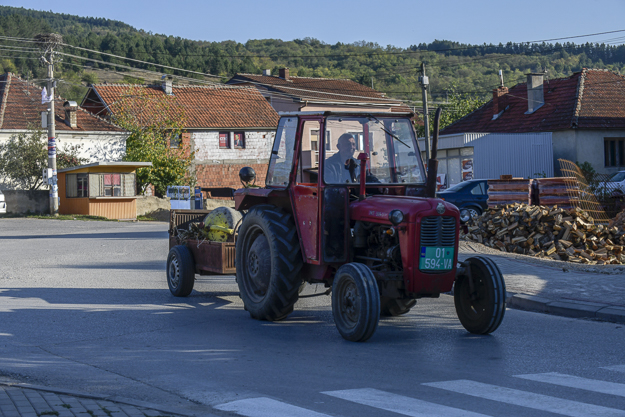
Photo: Atdhe Mulla / K2.0.
We say goodbye them and leave without shaking hands, while noticing that the short conversation has caught the attention of others.
“Serbs here live better than in Serbia,” says a man in his 30s who has no hesitation in chatting with us, but only for a short walk as he leaves his photocopy business and heads toward the bar in the center.
After a few hours, we leave Ranilug with a sense that people here have little connection to or knowledge of politics in Prishtina; under the heavy influence of Lista Srpska, the political atmosphere seems to have become toxic, while everyday residents say that they simply want to carry on with their lives normally.
North of the Ibër
A couple of days later, a bus drops me in the center of the southern part of Mitrovica. From here, it’s just a short walk through the busy city center until I find myself in front of the famous bridge over the Ibër river, which has come to symbolize the ethnic division of the city since the end of the war — Albanians to the south, Serbs to the north.
At the far end of the bridge, a Carabinieri police jeep stands guard, while down in the river, a flock of birds go about their lives in the water — all the birds are brown, and as I walk above them, I muse that they’re patiently waiting to become white when peace and reconciliation unifies this city again.
A few steps ahead, after slipping past the low concrete barricades at the end of the bridge, the coffee shops have begun to fill with people, trying to catch some rays of sun on a fresh autumnal morning, while the numerous Serbian flags resist the wind over their heads.
I’m thinking that there couldn’t be a lot of places in the world like this. Such a short walking distance separating different ways of thinking and living.
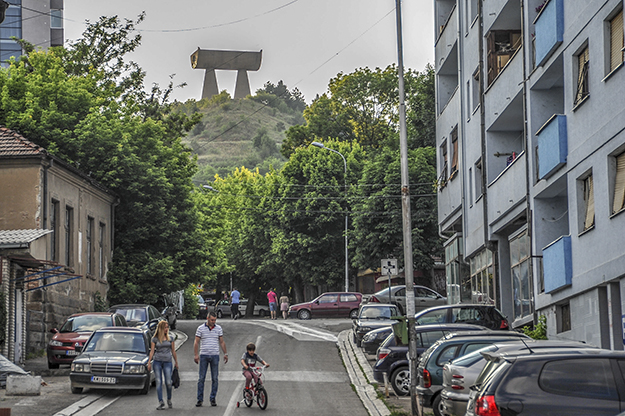
Photo: Atdhe Mulla / K2.0.
Nearby, a store that had been a betting shop only a couple months earlier looks almost abandoned, after the government of Kosovo imposed a law that made it illegal to organize betting or any sort of casino activity. But, the locals say that illegal betting has flourished since then. With a thriving social and cultural scene largely lacking, betting seems to be a hobby of choice for many youngsters.
The imposing statue of Prince Lazar signals that I’ve reached the center of the city. As in Ranilug, the usual Lista Srpska electoral placards and flags can be seen in windows and on walls on the city’s main roads, while some old banners depicting Aleksandar Vučić and his Progressive Party have lost their glow and are slowly fading.
After a couple of minutes walking through the main roads and some secondary passages, I find myself in a narrow alley filled with fast food and coffee shops, frequented mostly by young people.
Most people I try to talk with say that they don't really know much about who Albin Kurti is, although they say that he seems more intellectually capable than his predecessors.
The most common answer from the youngsters around is that they don’t know much about politics and that they have a lot of day-to-day problems to deal with rather than thinking about who’s in charge of running things in the games of high politics. The lack of rule of law and persistent nepotism are certainly high up on the list of concerns among the young people I speak to.
Most people I try to talk with say that they don’t really know much about who Albin Kurti is, although they say that he seems more intellectually capable than his predecessors, while maintaining that the delicate political situation is not one leader’s doing.
After a while, I’m introduced to a local businessman in his late 20s or early 30s who, unlike many others, doesn’t seem fazed when I tell him who I am and why I’m here.
Over the course of the next half an hour, he surprises me with his knowledge of what goes on in politics in Prishtina, something seemingly rare to find in Serb communities across Kosovo; the lack of communication and misinformation seems to be one of the main causes of the huge disagreements between communities on both sides of the bridge.
While we’re talking I feel as though he has been preparing for this conversation for a long time. One of the things that I ask him about is the source of his information, considering that the news around here is mostly spread by the Serbian media, much of which likes to engage in misinformation campaigns, keeping the readers in the dark over many important issues. He says that he also reads Albanian language newspapers based in Prishtina, even if he sometimes has to use Google Translate to understand them.
As I ask him for his thoughts on Kurti and the fact that he looks set to be the new prime minister, he says that he doesn’t know what to expect exactly, but adds that he can’t be any worse than those before him. Overall, he thinks that as an educated man, Kurti has sufficient insight to also listen to what the other side wants. The idea of starting a dialogue with local Serbs first, before going to Brussels, seems “phenomenal” to him.
“I think that Albin Kurti is too small to be burning the political scene for a long time.”
North Mitrovica resident
Referring to the former PDK-AAK-Nisma-AKR coalition in general and specifically to President Hashim Thaçi, using his wartime nickname, he says: “The snake can change its skin, but never its attitude.”
However, he seems pessimistic about the potential longevity of Kurti thriving on the political scene. “I think that Albin Kurti is too small to be burning the political scene for a long time,” he says.
He’s quick to express his opinion about the idea of some form of territory exchange between Kosovo and Serbia, a vague idea muted by presidents Thaçi and Vučić that has circulated with varying intensity over the past year or so.
“The land swap at first seemed a phenomenal idea, until we found out that only a few villages were going to be part of the exchange,” he says, referring to opaque comments made by Thaçi in September 2018 that referenced three villages in the north of Kosovo.
But he also believes it would affect Serbs living in different areas in different ways, saying that there is already a division between the Serbs that live north of the Ibër and those that live in other parts of Kosovo. The Serbs in the south think that all the money dedicated to the community in general is being invested in the north, he says.
“We in the north think that the Serbs in the south are selling their properties to Albanians and then becoming rich by buying huge properties here in the North.”
Just like with others who I ask about Lista Srpska, the question causes a change in facial expression and a worried look.
Switching to the dialogue process, he says that until now the process has been a disaster, a notion that comes up time and again among the people I speak to. While he thinks that a deal is necessary, he thinks that people “should not be hungry while thinking about that,” and a better standard of living is needed before a deal is to be found.
My interest in what he thinks about Vučić’s government and his influence here through Lista Srpska causes concern. Just like with others who I ask about Lista Srpska, the question causes a change in facial expression and a worried look, almost as though an invisible button has been pushed.
In the election campaign — just like in previous years — rival Serb political parties and candidates had been subjected to intimidation, threats and blackmail from the Belgrade-backed Lista Srpska; the official EU observation mission stated in its preliminary report that “fundamental democratic rights of freedom of speech, assembly and representation and consequently, the electoral process for Kosovo Serbs fell short of … international standards.”
Meanwhile, the vice president of Lista Srpska, Milan Radoičić, is still wanted for questioning by the Kosovo Prosecution in relation to his alleged role in the murder of Oliver Ivanović, the leader of the SDP Citizens’ Initiative who was shot outside his North Mitrovica offices in 2018. Despite this, Ivanović’s former party joined forces with Lista Srpska in October’s election, a move that saw a number of leading SDP Citizens’ Initiative figures resign.
In North Mitrovica, 98% of the Serb vote on October 6 went to Lista Srpska — while it received 7,117 votes, all other Serb parties together received just 169. It seems that here, everything is done with the green light from Belgrade.
“The population here is a body that is suffering hits from all sides.”
North Mitrovica resident
Despite my reassures to the businessman that our interview is anonymous, he still seems uncomfortable talking directly about Lista Srpska. But he does say that change is needed, not only at the top level of Serbian government, but also in municipalities and other layers of power, adding that it bothers him that there are always the same people deciding about the lives of young people.
“Vučić is nothing new,” he says. “He and other politicians in general often find themselves criticizing something that they were only four years ago.”
As we feel that the conversation is coming to an end, he tries to sum up his feelings, blaming both Serb and Albanian politicians for the situation.
“They instinctively destroy our lives in order to be able to impose their own ways, in order for their shit to smell better,” he says. “The population here is a body that is suffering hits from all sides.”
Survival depends on help from Belgrade
The trip to Gračanica from Prishtina is lighter as it’s only 10 kilometers out of the capital, right after the Hajvalia neighborhood. The main road winds through the center of town, past the monastery. Part of the primary artery for people traveling to Gjilan or Lake Badovc, Gračanica is a bit more lively and noisy than other smaller localities where Serbs live around Kosovo.
A considerable number of young people fill the cafes on a sunny afternoon, while we walk from the municipality building toward the main roundabout up the road. By now, our eyes are already familiar with the white posters of Lista Srpska and the same peeling and unreadable old posters of Vučić from prior elections in Serbia that I had seen in North Mitrovica.
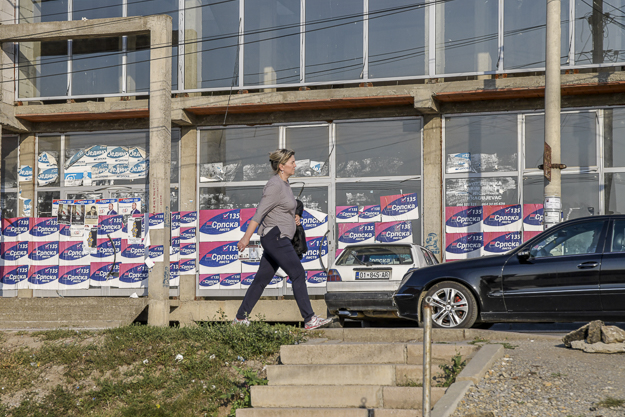
Photo: Atdhe Mulla / K2.0.
A couple of vendors chat and laugh together, sitting on a park seat right in front of their shops where they sell various household supplies. Their refusal to talk about political matters is immediate.
“We work with people here,” one of them says, gesturing toward his shop a few meters back.
From our short chats and by observing the general situation around us, we get the sense that people in Gračanica and other Serb communities have a lot to say, just like everyone else living in areas tormented by problems, but that they’re reluctant to talk for fear of pressure from political elements and other kinds of influence from neighbors and other citizens.
Stefan Filipović, a political scientist who works for the Center for Peace and Tolerance, has agreed to be interviewed.
“We first need to fix our daily worries, like the pollution, and then we can talk about flags, borders and anything.”
Stefan Filipović, Center for Peace and Tolerance
He says that the people of Gračanica expect a substantial change in approach from the new Kosovo government toward Serbs. But he adds that the expectation does not depend on the figure of Albin Kurti, but more on the need to address certain problems that bother the community daily, like the fact that many young people choose to leave Kosovo for better lives in other countries, or integration and pollution.
“We have serious issues in our lives,” he says. “The Serb community here is very near to physical disappearance because of unemployment — Kurti is not that big a threat for us.”
He also relates this to the fact that Lista Srpska once again received the vast majority of Serb votes — 93% in Gračanica — saying that politicians in Prishtina should ask themselves what they’ve done for the Serb communities until now when seeking the answer to Lista Srpska’s overwhelming majority. “There are a huge amount of families here that literally cannot survive without the help from Belgrade,” he says.
The people I speak to in Gračanica seem to know more about politicians like Hashim Thaçi or even Ibrahim Rugova than about Kurti. It’s something that surprises me, given the Vetëvendosje leader’s protests — some of them ending in violence — against the dialogue process and past plans aimed at giving more rights to the Serb minority in Kosovo such as the Ahtisaari package that ultimately saw Gračanica established as its own municipality.
“We first need to fix our daily worries, like the pollution, and then we can talk about flags, borders and anything,” Filipović says. “We, Albanians and Serbs, have no difference in the things that we are very mad about.” K
Feature image: Atdhe Mulla / K2.0.







